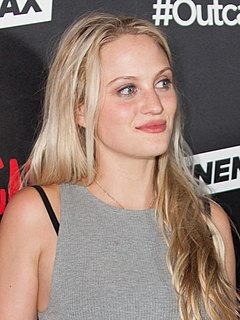A Quote by Thomas Mallon
I often tell people who want to write historical fiction: don't read all that much about the period you're writing about; read things from the period that you're writing about. There's a tendency to stoke up on a lot of biography and a lot of history, and not to actually get back to the original sources.
Related Quotes
I don't want to write poems that are just really clear about how I'm aware of all the traps involved in writing poetry; I don't want to write fiction that's about the irresponsibility of writing fiction and I've thrown out a lot of writing that I think was ultimately tainted by that kind of self-awareness.
I think it's important to humanize history; fiction can help us remember. A lot of books I've read in the past have been so much more important than textbooks - there is an emotional connection with one particular person. I'm very much of a research-is-important type of fiction writer, even for contemporary fiction. I wrote about blogs in America and I've never blogged. But I read many, many blogs - usually about feminist things, or about race, or about hair.
The second book, which was probably more from a professional standpoint - when I read Junot Díaz's Drown, I was like, Oh my god, you can write these stories and people will actually read them beyond your own little community. This guy's book is blowing up and it seems like [he's writing about] the neighborhood that I grew up in. That was a big deal. I read that in graduate school, so that's when I was really taking writing seriously, but I didn't know you could do it. I didn't know you can actually be an author. It was a weird epiphany.
For me writing is a long, hard, painful process, but it is addictive, a pleasure that I seek out actively. My advice to young writers is this: Read a lot. Read to find out what past writers have done. Then write about what you know. Write about your school, your class, about your teachers, your family. That's what I did. Each writer must find his or her own kind of voice. Finally, you have to keep on writing.
You have to get inside the people you are writing about. You have to go below the surface. And that's to a very large degree what all writers are doing - they're trying to get below the surface. Whether it's in fiction or poetry or writing history and biography. Some people make that possible because they write wonderful letters and diaries. And you have to sort of go where the material is.
Utopian fiction is really boring. I had to read a lot of it, and it's not that much fun. But they're fascinating to me as historical documents. Cabet [Icaria's founder and author of the utopian novel, Travels in Icaria], is writing in the 1830s, and his idea of the perfect society reveals a lot about his time. But his book is uniquely bad.
But I think writing should be a bit of a struggle. We're not writing things that are going to change the world in big ways. We're writing things that might make people think about people a little bit, but we're not that important. I think a lot of writers think we are incredibly important. I don't feel like that about my fiction. I feel like it's quite a selfish thing at heart. I want to tell a story. I want someone to listen to me. And I love that, but I don't think I deserve the moon on a stick because I do that.
The great thing about Twitter is, you get a lot back, and I read through a lot, and I want my fans to know that I do read a lot, and it's why I do respond or retweet clever posts, and I'm constantly amazed by the cleverness of people on Twitter. I just think it's a really great tool to communicate with fans and influence conversations and raise awareness about things I'm interested in, that I think deserve some attention.
I'm a spiritual person, I believe that if you read the bible, you get what you want from it. But, when you actually read it, you see the beauty, spirituality, the joy and love and what makes us godly. And then if you read between the lines of all the same books, you always see the human influence in the writing... it's not all about religiousness, it's about spirituality.






































